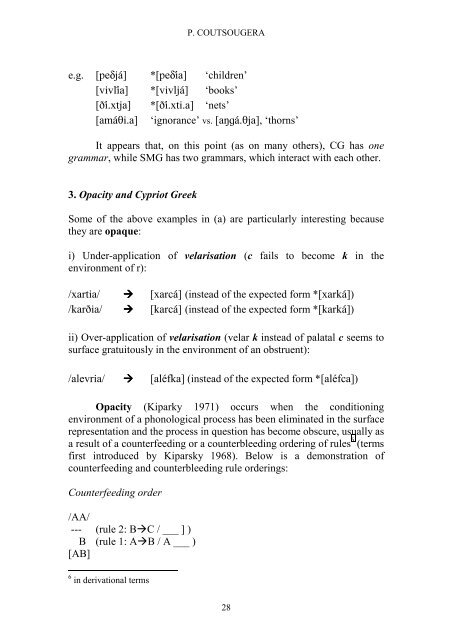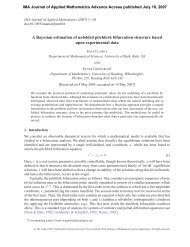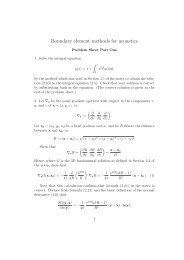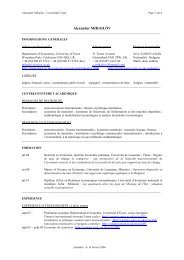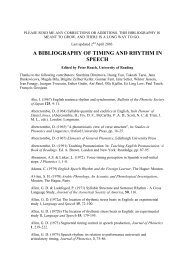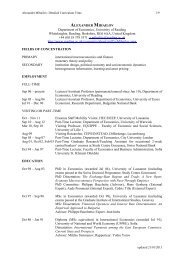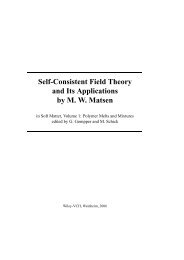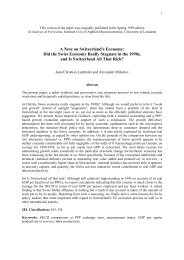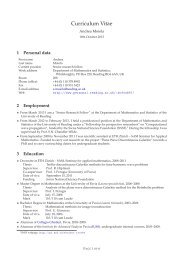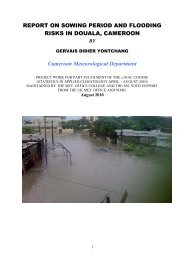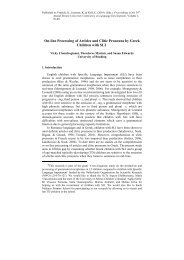Reading Working Papers in Linguistics 4 (2000) - The University of ...
Reading Working Papers in Linguistics 4 (2000) - The University of ...
Reading Working Papers in Linguistics 4 (2000) - The University of ...
Create successful ePaper yourself
Turn your PDF publications into a flip-book with our unique Google optimized e-Paper software.
P. COUTSOUGERA<br />
e.g. [peδja'] *[peδi'a] ‘children’<br />
[vivli'a] *[vivlja'] ‘books’<br />
[1i'.xtja] *[1i'.xti.a] ‘nets’<br />
[ama'?i.a] ‘ignorance’ vs. [a@Aa'.?ja], ‘thorns’<br />
It appears that, on this po<strong>in</strong>t (as on many others), CG has one<br />
grammar, while SMG has two grammars, which <strong>in</strong>teract with each other.<br />
3. Opacity and Cypriot Greek<br />
Some <strong>of</strong> the above examples <strong>in</strong> (a) are particularly <strong>in</strong>terest<strong>in</strong>g because<br />
they are opaque:<br />
i) Under-application <strong>of</strong> velarisation (c fails to become k <strong>in</strong> the<br />
environment <strong>of</strong> r):<br />
/xartia/ ! [xarca'] (<strong>in</strong>stead <strong>of</strong> the expected form *[xarka'])<br />
/kar1ia/ ! [karca'] (<strong>in</strong>stead <strong>of</strong> the expected form *[karka'])<br />
ii) Over-application <strong>of</strong> velarisation (velar k <strong>in</strong>stead <strong>of</strong> palatal c seems to<br />
surface gratuitously <strong>in</strong> the environment <strong>of</strong> an obstruent):<br />
/alevria/ ! [ale'fka] (<strong>in</strong>stead <strong>of</strong> the expected form *[ale'fca])<br />
Opacity (Kiparky 1971) occurs when the condition<strong>in</strong>g<br />
environment <strong>of</strong> a phonological process has been elim<strong>in</strong>ated <strong>in</strong> the surface<br />
representation and the process <strong>in</strong> question has become obscure, usually as<br />
a result <strong>of</strong> a counterfeed<strong>in</strong>g or a counterbleed<strong>in</strong>g order<strong>in</strong>g <strong>of</strong> rules 6 (terms<br />
first <strong>in</strong>troduced by Kiparsky 1968). Below is a demonstration <strong>of</strong><br />
counterfeed<strong>in</strong>g and counterbleed<strong>in</strong>g rule order<strong>in</strong>gs:<br />
Counterfeed<strong>in</strong>g order<br />
/AA/<br />
--- (rule 2: B!C / ___ ] )<br />
B (rule 1: A!B / A ___ )<br />
[AB]<br />
6 <strong>in</strong> derivational terms<br />
28


